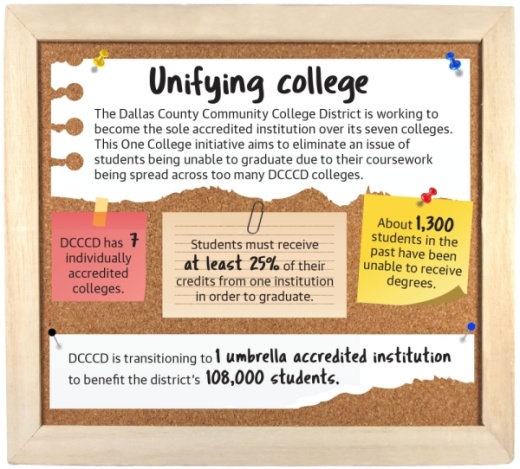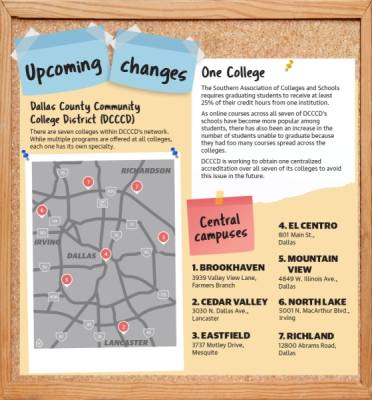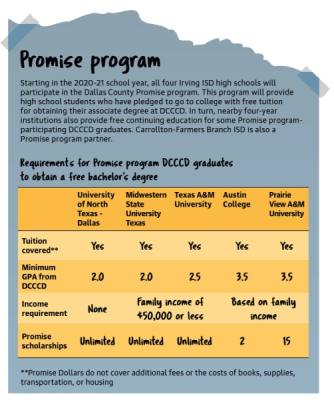The source of the issue—a technicality—lies in a policy administered by the Southern Association of Colleges and Schools that requires graduating students to receive at least 25% of their credit hours from a single institution.
But the district has seven different colleges within its system, which has resulted in a total of about 1,300 students in previous years being unable to graduate because their courses were too spread out among the district’s colleges. This issue has reached a tipping point as students have begun taking more online classes at multiple DCCCD colleges.
A new initiative aims to eliminate that issue. The district is moving the accreditation of all seven colleges under one umbrella institution. This shift, dubbed One College, is expected to eliminate similar problems for graduating students while also removing enrollment barriers for prospective students.
The One College initiative is expected to provide even more benefits to local school districts. Coppell ISD, Irving ISD and Carrollton-Farmers Branch ISD partner with DCCCD to offer college courses to their high school students through dual-credit and other college-level programs, according to district officials.
“There are all of these stumbling blocks,” said Deana Dynis, the executive director of teaching and learning at CISD. “Even between North Lake [College] and Brookhaven [College], which ... are really a stone’s throw from each other, we struggle and often miss deadlines. ... To know that all of that is going to be streamlined will provide us with more opportunities.”
For example, if the One College shift results in more high school students enrolling in DCCCD colleges, CISD could begin providing transportation between campuses, Dynis said. That could look like offering shuttle services and using public transportation through Dallas Area Rapid Transit’s future rail station at the nearby Cypress Waters mixed-use development, she said.
North Lake College is one of DCCCD’s seven colleges, and it operates out of four campuses, including two in Irving, one in Coppell and another near the Dallas Fort Worth International Airport.
Centralizing accreditation
The community college district was first formed in the 1960s and ‘70s with the goal of providing accessible higher education for all of Dallas County, North Lake College President Christa Slejko said.“[The colleges] were strategically positioned all around the county by the original board so that any citizen of Dallas County would be only 10 minutes [away],” Slejko said. “People really identified with their neighborhood college.”
While the seven schools are governed under the same administrative body, Slejko said the individually accredited college model did not become an issue until more students began enrolling in online courses.
“We had an a-ha this summer when we saw that there were [about] 400 students on the books who had all their hours, but they couldn’t graduate because they had such a mix [of colleges],” Slejko said. “That was terrible and certainly never intended, but we were hamstrung.”
Some students’ solution was to enroll in more courses to get at least 25% of their credits from one college, Slejko said. Others simply never graduated.
In response, DCCCD is working to receive one centralized accreditation from the Southern Association of Colleges and Schools. That is the body that provides accreditation to colleges and universities in Texas and other nearby states.
While this move will ensure more students can graduate, many will not notice the difference, Slejko said.
“Your degree would be a [DCCCD] degree, but it would be [at the] North Lake campus,” Slejko said. “We expect to maintain our name at the campus level because there is a recognition that there’s still a strong local community and that each college/campus still is a member of a distinct community, and we don’t want to lose that idea.”
Removing barriers
College students are not the only ones to benefit from the One College program. CISD, CFBISD and IISD high school students enroll in DCCCD colleges for in-person and online courses.“Because we have the option of online, really, I would encourage all families to look at where dual credit might fit in their learners’ trajectory,” said Dynis, the CISD executive director of teaching and learning. “It’s an amazing opportunity from even a financial standpoint [to get] some of those core courses out of the way and at really ... little to no expense.”
Dynis said she is hopeful the One College initiative will reverse a downward enrollment trend in DCCCD courses taken by CISD students.
“Certainly having this one barrier out of the way I think will open the door for increased enrollment, and those numbers have been dipping over the last couple of years in dual credit,” she said.
Tracey Brown, IISD’s director of guidance, counseling and college and career readiness, said moving to the single accredited system will remove roadblocks for students who have no college experience.
“If [students] go to North Lake for this class and Eastfield for that class and Cedar Valley for another class and they’re able to see one common ... system, I think that would be fantastic and would help to provide clarity for our students,” Brown said. “Anytime we can help to streamline the process for our students, the better.
“We have to realize that [for] our students ... this is their first time in college.”
Other DCCCD programs
The One College initiative is just one of many avenues DCCCD and area school districts are pursuing to make higher education more accessible.For example, IISD is partnering with North Lake College to launch the Singley Collegiate Academy in the 2020-21 school year. It is a tuition-free program that will offer freshmen and sophomores some of the basic college courses while at the Singley Academy campus. Juniors and seniors will then take all of their classes at the nearby North Lake central campus.
Along with its dual credit opportunities, CFBISD is also partnering with DCCCD to launch a work-based education program in the 2021-22 school year, said Jo Gillen, CFBISD’s executive director of career, college and military readiness. Students enrolled in the program, Pathways in Technology Early College High School, can earn their high school diploma and an associate degree with industry certificates in four to six years.
Additionally, DCCCD is continuing to expand a scholarship program that provides free tuition to students graduating from participating school districts, Slejko said. All four IISD high schools will be part of DCCCD’s Promise program beginning in the fall.
The Promise scholarship program provides free DCCCD tuition to students who pledge to attend college upon graduating from high school.
“When schools join the Promise, they have their big pledge drive, and ... they try to get 90% or more of their kids to pledge to go to college,” Slejko said. “If you choose to go to any of the Dallas County Community Colleges, you have up to 60 [credit] hours and an associate’s degree. Now that’s pretty ... cool.”







